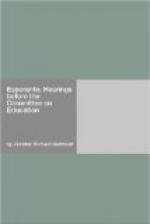Mr. Towner. You mean that 87 per cent of the words now in the Esperanto vocabulary are formative words?
Prof. Christen. Yes: they are connected with the English language, and from each Esperanto word you can form mechanically absolutely every word that sense and logic can possibly connect with the one and only meaning of the original Esperanto word. I am accustomed to lecturing before audiences and making this statement, which I make without fear of contradiction, that “if all of you were to take up Esperanto now and carry it on until you were as expert in it as I am, you would not in the whole of your studies come across more than 60 words, probably not more than 50 words, which are entirely new to you.”
Mr. Towner. Of course, a vocabulary of 3,000 words is a very limited vocabulary; it is a primitive vocabulary?
Prof. Christen. Yes?
Mr. Towner. How are you going to increase it? For instance, how are you going to make it a literary language? How are you going to write poems?
Prof. Christen. Personally I should not want an international language for poetry, although Esperanto does in fact lend itself excellently to the purposes of the muses. But to answer your question: First of all, the Esperanto language does not contain any words at all; I think there are only 138 full-fledged words, prepositions, adverbs, and conjunctions, but the rest of the vocabulary is formed of roots only. Let us take the words “to sew,” “to stitch.” The root is “kudr.” It is only a root, and that alone stands in the vocabulary. Now, if you want to make this root into a noun “o” is added to it, “kudro”: if you want to make it an adjective, you add “a” to it, “kudra”; if you want to make it an adverb you add “e,” kudre, which would mean by or through sewing, “sewingly,” if it could be so expressed in English; and if you want to make it a verb it would be “kudri,” because every infinitive ends in “i.” You see, with that root to begin with you can form four words, and you can express a great deal more in Esperanto than anybody can possibly imagine; in fact Esperanto is, on account of its perfect and absolutely complete flexibility, more precise and more comprehensive than any language under the sun. As I said before, you can form four words from every root at the start if sense allows it, and sense allows you a great deal more leeway in Esperanto than anybody can possibly know about, because in no language are you allowed to proceed by sense. The English language does not allow it, nor does any other, not oven German or Greek, but it is allowed in this most logical of all languages, Esperanto. (7)




